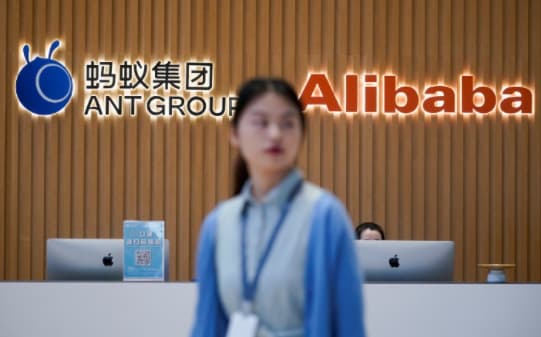Chinese Group Holding Limited, Alibaba, has remained under the spotlight for many wrong reasons ranging from antitrust concerns to monopolistic behaviour as asserted by the Chinese government.
The Group’s Holding company doubles as the parent company to China’s largest payment platform, Ant Group, formerly known as Ant Financial and Alipay.
Boasting more than one billion users, 80 million merchants, and a Total Payment Volume (TPV) reaching CN¥118 trillion in June 2020, Ant Group is unarguably a payment giant.
Until recently, the Chinese payment giant has enjoyed unfettered growth for close to six years of establishment, one that almost led to a successful $34 billion IPO listing on the Shanghai stock exchange.
What happened, and where are the issues coming from?
In a recent development, The People’s Bank of China, doubling as the country’s Central Bank, proposes that Ant Group hand over its data to the newly established state-run credit scoring company (SSC), including the state lenders.
Simply put, the Chinese government wants Ant Group to share its customer base data with other financial institutions under its administrative watch, and vice versa.
In justifying its latest approach, PBoC claimed – following a thorough investigation into alleged Alibaba monopolistic practice – that the latest proposition aims to create a levelled ground and fair market for all fintech and commercial financial entities.
Also, according to various industry experts, the preliminary plan which PBoC is spearheading is a build-up on an existing plan laid by the regulatory Bank to tighten its grip over the country’s internet sector. More so, it marks the latest crackdown on Jack Ma’s financial technology Group.
While the Central Bank’s proposition favours the majority, the new development is detrimental to Ant Group’s superior positioning in the financial market.
Unable to compromise the government’s data right assertion in the sector, Ant Group, on the other hand, proposed that it should lead the new company in an attempt to minimize government interference.
Although not stated by the company, the reason for its suggestion can only be attributed to the fact that Alibaba’s Ant Group owns the largest market share among its pair.
ALSO READ: ANALYSIS: Why Ghana Is The Preferred Destination For Automotive Investors
Specifically, the fintech giant accounts for one-third (⅓) of China’s total fintech market share. According to a report by CNBC, Alibaba’s Ant Group and Tencent’s WeChat Pay both own a whopping 80% of the China market share.
So far, the suggestion from Ant Group seems to have fallen on deaf ears as the Chinese government is still bent on establishing a joint venture with local technology giants to oversee and manage the data that have been collected from several millions of users.
According to sources familiar with the ongoing development from the PBoC side, dancing to the tune of Ant Group would further create conflicting interests while making the goal impossible to reach.
“The top priority is to make sure the new business fully complies with regulations…State involvement will help the PBoC attain its goal,” the source explained.
Whether Ant Group will be a part of the joint venture remains unclear; however, we deem it almost impossible for the tech giant to be left out, considering its high stake in the whole of the new development.
While the latest appears to be a very strict measure against Alibaba’s Ant Group, the proceeding part of this article will share more light on some background stories spanning close to a year
Here are some background stories that may add up to the reason why PBoC resulted in the latest development;
Banks vs. Fintech players (Ant Group)
Unlike anywhere else in the world, fintech players in China enjoy these four growth drivers; shortage of supply in the formal financial market, strong government support for promoting financial inclusion through digital technology, a highly developed and advanced e-commerce sector, and a more tolerant regulatory environment.
While the later growth driver is the exact opposite for the commercial banks, they have always pushed for fintech companies to be subjected to the same seeming harsh regulations.
However, the beef between the two fractional industries of the finance sector has existed for years unattended by the government until recently.

Source: AZcoin News
All along, players in the fintech space were able to maximize the opportunity to a very significant extent, one that positioned China as the biggest fintech market globally.
Specifically, McKinsey reported in 2016 that China led the world in terms of total users and market size, adding that China’s internet finance sector was valued upward of $1.8 trillion and pretty much dominated by players from the payment sector.
“Financial-technology (or fintech) start-ups are mushrooming, as are company valuations; capital markets are aggressively pursuing the Internet finance industry; and consumer behaviour is altering dramatically,” excerpt from McKinsey report read.
Even more recently, Statista reported that the largest market segment in China’s fintech industry – Digital Payments boasts of a total transaction value worth approximately $2.915 trillion as of 2021.
Notably, Alibaba’s Ant Group is the greatest beneficiary of the speedy growth experienced in the country’s internet finance industry, owning one-third of the overall market share.
However, on the contrary, traditional banks queue behind the fintech for many reasons, including structural limitations and the underserved population, two of the major gaps that the fintech companies were able to fill with their disruptive innovations.
ALSO READ: Health Advocate Around The Globe Petitions Against Instagram For Children
To tap into the trend, some traditional banks facilitated aggressive investments in innovative digital services. However, it wasn’t enough compared to having an equal opportunity to leverage on the same infrastructure.
In some other cases, some traditional banks were displeased about the non-favourable regulations and sought an overall review of the operational guideline in the space.
These subsequently led to a series of regulations in the sector, as highlighted in a report by the Asian Development Bank Institute (ADBI) and followed by the most recent attempt by PBoC to restructure the entirety of the fintech space.
Notably, Alibaba enjoyed most of the benefits, likewise other fintech players, including Tencent’s WeChat, among others who will also be affected by the ongoing development.
Ant Group Financial IPO listing
Towards the end of 2020, Alibaba’s Ant Group announced plans to raise about $34.5 billion in an Initial Profit Offering (IPO) through a dual-listing on both the Shanghai and Hong Kong stock exchange.
Although unsuccessful, the listing would have broken a world record for the largest IPO listing to date, with Ant Group planning to split its stock offering evenly across both exchanges.

Source: Hive Life
At the initial time of the announcement, about 1.67 billion Ant Group shares were reported to be up for grabs, while per unit share on SSE and HKSE was priced at $10.26 and $10.32, respectively.
However, the record-setting IPO listing halted for various reasons, including regulatory issues, most of which were raised by the China Security Regulatory Commission (CSRC).
According to a Shanghai Stock Exchange (SSE) statement, Ant Group faced significant issues relating to changes in the financial technology regulatory environment.
CNBC, who translated excerpts of SSE’s statement from Mandarin to English, reported that some of the issues raised against Ant Group also include its inability to meet certain conditions for listing or perhaps failure to meet the “information disclosure requirement.”
Although the statement by SSE wasn’t elaborate, it was clear as day that forces beyond the control of the payment giant were not in alignment with the company’s move.
Alibaba Chief goes missing
Before the announcement of the Ant Group IPO listing, Alibaba’s Chief, Jack Ma, who owned about 33% share of the payment company, had reportedly criticized China’s slow and risk-aversive banking industry.
According to a report by TheWallStreetJournal, Ma’s act led to the eventual suspension of Ant Group’s IPO listing. In the report, WSJ wrote that China’s President Xi Jinping personally decided to halt the IPO of Ant Group.
Although the actual reasons for the suspension of Ant Group IPO listing were not revealed, reports from numerous sources claimed it was a response to Ma’s untamed utterances regarding the nation’s financial system.

Source: Markets Insider
The billionaire entrepreneur was said to have attended an event that also had the attendance of Chinese regulators. At the event, Ma, who is very displeased about the series of events around Ant’s Group stock listing, claimed that the financial and regulatory system in the country stifled innovation and must be reformed to ensure growth in the sector.
ALSO READ: Xiaomi Tosses Huawei Aside, Becomes First Smartphone Brand In China
In his words, Alibaba’s founder described Chinese banks’ mode of operation as that with a “pawn-shop mentality,” adding that the authorities were trying to “use the way to manage a railway station to manage an airport.”
While Ma’s statement steered many mixed reactions, it was wrongly received by the banking establishment, subsequently attracting the attention of President Xi Jinping.
On the regulatory front, financial analysts believed that Ma’s push for Ant Group to be treated as a tech company rather than a financial institute could also have contributed to its regulatory woes, amidst all of which Jack Ma went missing.
For close to three months, Ma was nowhere to be found, and this caught the attention of mainstream media, who opined that the Chinese businessman was either placed under house arrest or, in an otherwise scenario, detained.
However, it was revealed that Ma and some of his colleagues were summoned for a meeting with regulators, although nothing was later said about what happened when the Chinese billionaire was away.
While Ma was subsequently spotted in public on January 20, popular Chinese analyst Christina Boutrup claimed that the billionaire entrepreneur was rather keeping a low profile, an option she considered to be the best.
Chinese government introduces a new anti-monopoly guideline
Amidst ‘Jack Ma’s vs. regulator’s saga,’ the Chinese government considered a new approach to regulating the tech giant and extension other players within the internet finance space.
To get started, the Chinese government launched an anti-monopoly investigation into Alibaba Holding Group, a move that resulted in a record fining of about $2.8 billion against the Chinese tech giant.
While Alibaba isn’t the only company to be fined by the Chinese government, about 12 other companies, including Tencent and Baidu, were also fined for reasons relating to violation of anti-monopoly rules.

Source: China Certification
The escalation of the anti-monopoly scrutiny across the internet finance sector calls for a review of the set guidelines, leading to the introduction of newer ones.
In November, China released a draft of what will eventually become the new anti-monopoly guidelines for its platform economy, which consist of digital payment and e-commerce industries, two of which have been experiencing an explosive expansion over the last decade.
The likes of Alibaba, Tencent, and Ant Group ranked as the top three players in the platform economy’s super-league enterprises in China and are the ones most affected by the new guidelines.
Of course, it is no news that these three internet giants have gained so much economic power, so much that several concerns have been raised about the negative impact they have on the market and other players therein. The trio has been associated with unfair competition, monopolies, and infringement on regulatory orders.
To address some of these concerns by beefing up the existing regulations and guidelines, the Chinese government increased scrutiny and penalties for any company found guilty of violating its rules. While at it, the Chinese government also considers some peculiarities, i.e., limitations of the evolving and expanding platform enterprises.
ALSO READ: Tesla’s Bitcoin Acquisition Pays Off As Company Reports $101 Million BTC Profits In Q1
Fast-track to February, about two months away from the initial revision of its existing regulations, the Chinese government, through the State Administration for Market Regulation (SAMR), finally issued new anti-monopoly rules specifically targeted at its tech giants.
For one, the new rules, which formalize the previous draft that was shared towards the end of 2020, tightened existing restrictions mostly faced by the country’s tech giants.
While the new rules put more pressure on the country’s leading internet services, which include Alibaba’s Taobao, and JD.com (Tmall marketplace), they are also extended to cover other areas like payment services where Alibaba’s Ant Group is also dominant, alongside Tencent Holdings WeChat Pay.
Overall, as seen on SAMR website, the new rules expressly bar companies from a wide range of behavior, some of which include forcing merchants to choose between the country’s top internet players (what appears to be a long-time market behavior in the Chinese finance market).
SAMR, which is also tasked with unifying anti-monopoly law enforcement, guides the investigation of illegal charging, pyramid selling, and unfair competition, among others, adding that the latest guidelines would “stop monopolistic behaviors in the platform economy and protect fair competition in the market.”
Alibaba asked to remodify its business model to comply with regulatory requirements
Before issuing a new anti-monopoly guideline, the Chinese government had already ordered that Ant Group rectify its business model.
According to a statement, Ant Group lacked what PBOC described as “a sound governance mechanism,” adding that the payment giant “defiles regulatory compliance requirements” while also “engaging in regulatory arbitrage.”
The order, which also comes before the eventual suspension of the company’s IPO listing, asked that Ant Group should formulate a rectification plan as well as an implementation timetable to follow strictly.
Some of the rectification plans for the payment giant cut across services such as credit, insurance, and wealth management, among others.
PBOC also found the company guilty of using its market position to exclude rivals and, by extension, hurting the rights and interest of consumers; it finally asked that the business rectification plan be treated as a matter of urgency.
Source: TheHindu
While it looks like the central bank chose the most unfavorable time to carry out its regulatory function over Ant Group, the orders were bound to limit Ant Group’s expansion and subsequently, disrupting their lucrative internet finance business. The scrutiny also comes amid the period that the Chinese government closely examines the influence of the country’s internet sector.
Other orders given to the payment giant include establishing a payment holding company that holds sufficient capital while asking that it return to its payment origin. These, according to PBOC, will “enhance transparency around transactions, prohibition of unfair competition, and improvement of corporate governance.”
The Ant Group later responded to the government in good faith, informing that it would comply with all regulatory requirements and enhance risk management and control.
We appreciate financial regulators’ guidance and help…The rectification is an opportunity for Ant Group to strengthen the foundation of our business to grow with full compliance and to continue focusing on innovating for social good and serving small businesses,” Ant Group said in a statement.
China fines Alibaba $2.8 billion amid an antitrust investigation
Earlier in April, the Chinese government slapped a record fine of $2.8 billion on Alibaba Group Holding Ltd., resulting from an ongoing anti-monopoly probe stemming from the place of its market dominance.
While the fine is deemed a record-breaking one within the Asian region, it almost triple the former high of almost $1 billion that the U.S. chipmaker Qualcomm Inc. had to pay in 2015.
Also, Alibaba’s latest fine falls within the range of Facebook’s, considering that the social media giant is as notorious for huge finings, with the highest imposed, although yet to be paid, $5 billion.
The fine, which is also a result of the Chinese government’s scrutiny into the tech giant’s suspected monopolistic behavior since December, marks about 4% of Alibaba’s total 2019 sales in China – approximately $69 billion. This percentage is also worth about 12% of the company’s fiscal net income for 2020. That said, the fine only represents a drop in the ocean of Alibaba’s wealth.
Ant Group boss, Sion Hu steps down amidst Group restructuring
The financial technology company, Ant Group announced amid its restructuring in March that the Group CEO, Simon Hu has resigned for personal reasons.
Daily Advent: Ant Group CEO, Simon Hu
Simon who had worked as the Group President for only about one year was later succeeded by Eric Jing who took over the vacant role immediately.
Before he became the President of Ant Group; Hu formerly served as the CEO of Alibaba Cloud Computing for about four years, after which he founded AliFinance (now An Group).
Hu’s replacement was also said to be based on a joint agreement by the Group Board of Directors which also includes Jack Ma himself.
Although the obvious reason for making his decision could be attributed to the increasing scrutiny of the Group by the Chinese regulators, Hu claimed to have made the choice to step down on a personal basis.
Reviewing China’s over one-decade-old anti-monopoly rules
Although anti-monopoly rules or guidelines became more prominent in China in the last decade ending 2020, antitrust laws and regulations date back to the late‘70s.
A study of China’s competition policy reforms by Wenton Zheng from the University of Florida reveals that China transitioned from a centrally planned economy to a market economy in the late 1970s. Around this time, the Asian country realized the importance of a good competition policy and its potential impact on the economy.

Source: Asian Business Law Journal
Subsequently, China began to experiment with new reform measures while enacting new fundamental antitrust laws and regulations to promote fair competition among stakeholders in its economy.
However, over time, there were reports of increasing competition issues, which prompted China to develop a more comprehensive antitrust law. Specifically, in 1994, China introduced and enacted its first anti-monopoly law (AML), which doubles as the first comprehensive antitrust law in the country.
Thirteen years down the line, on August 30, 2007, China’s National People’s Congress (NPC) eventually adopted what it tagged AML.2, which prompted China to develop, which made regulatory provisions similar to those found in most other countries’ antitrust laws. While the 2007 AML came into force exactly a year after, in 2008, Some of the provisions include “prohibition of horizontal agreements and abuse of market power and requirements for pre-merger notifications and reviews.”
ALSO READ: Digital Yuan: China To Become First Country To Issue A Central Bank Digital Currency
Also contained in the AML are other provisions that are not typical of antitrust laws, such as State-Owned Enterprises (SOEs) in important economic sectors, trade associations, and monopolies created by government agencies.
While the anti-monopoly laws in China have continued to evolve in the last 12 years that followed, it has done so, using various approaches, albeit none that tackled the fintech sector, which had only been around for barely two decades now. However, the reason for the prolonged exception could be attributed to the government’s favoritism towards the sector.
More recently, China has quickly emerged as an important competition law jurisdiction both at the local and international front. The country currently ranks third largest antitrust jurisdiction globally, next to the U.S. and the European Union. Considering the recent happening in the internet space, especially with the fintech giants like Ant Group, there was an urgent need for the country to beef up its anti-monopoly laws (guidelines).
Local banks and state lenders benefit significantly from the ongoing anti-monopoly war
Undoubtedly, the Chinese payment giant – Ant Group is witnessing its worst nightmare since its establishment in 2003, like Alipay, before it was later rebranded as Ant Group in October 2014. Beyond the immediate financial implication, which resulted in a fine total of $2.8 billion, Ant Group will also be hit greatly in profitability moving forward.

Source: CoinDesk
To better explain this part, questions like “what is the size of Ant’s China business to their entire business geo coverage?” must be answered.
Also, it is imperative to understand clearly “whether losing control of China’s internet finance market as a result of shared-data, will be an influencing factor on other established markets.”
First, Ant Group is the world’s largest fintech company and the fourth-biggest financial company by market capital and valuation put at slightly above $200 billion as of 2021. The current valuation could have gone as high as $313 billion if the company’s plan for dual-listing on Shanghai and Hong Kong stock market was successful.
The company, which boasts of establishment in Europe, the U.S., and India, has merchants that accept Alipay or Ant finance as payment options across its various parts of the world. In Europe, the company boasts partnerships with European digital wallets, including ePassi (Finland), Vipps (Norway), MOMO (Spain), Pagaqui (Portugal), and Blue code (Austria).
Although there has been a long-time coming trade war between China and American, the payment giant still accounts for a significant number of users in the region. In September 2020, the U.S. authorities were reportedly considering restrictions on Ant’s Group payment system. Then, The U.S. State Department recommended that Ant Group be added to the Entity List; however, the plan to sanction the company was subsequently withdrawn.
In India, Ant Group’s partnership with Paytm has also been very instrumental. Although, due to friction between both parties, rumor had it that the Chinese payment giant was planning to sell 30% of its stakes in Paytm in recent development. However, both parties have since denied that such a move is underway.
In terms of market value in India, Ant Group accounts for barely $5 billion of the total $16 billion that Paytm, a payment company backed by Japan’s SoftBank Group Corp., was reportedly valued by Reuters during a fundraising round.
ALSO READ: Tesla’s Bitcoin Acquisition Pays Off As Company Reports $101 Million BTC Profits In Q1
In comparison, the Indian market accounts for a very minute percentage of Ant Group’s total market volume. Also, there is little assurance that the payment market volume in the U.S. will be worth even more.
Simply put, the Chinese market accounts for Ant Group’s highest market volume share – clearly above 80%. Given the latest order by the Chinese government to share its data with other market players, Ant Group may suffer a continuous decline in market volume down the line until the financial market ground in China is completely leveled for all players.
Analyst opinion on China’s anti-monopoly stance (will China create a truly fair market)
Whether China will create a truly fair market for all stakeholders is still unclear, considering that fair trade has not been a practical subject. However, the recent events in the country’s internet space clearly show the need for regulatory reform.
Beyond the economic benefits, the ongoing reform clearly shows a power-play by the Chinese government, which still greatly controls its economy. It is, however, bothering to see how this looks like a targeted battle at the giant players. Regardless, given that its regulatory reforms are approached from a holistic perspective, one could hope for a truly fair market in the long run.
Takeaways
The biggest takeaway from this article is that the Chinese government plays a significant role in determining the long-term success of private and public stakeholders. When their authority is greatly threatened, it will go all out to stay relevant.



















 and then
and then